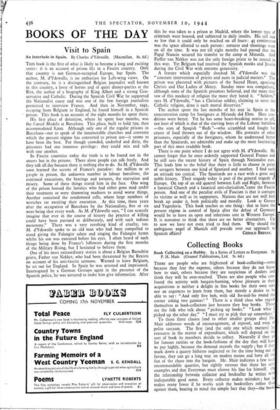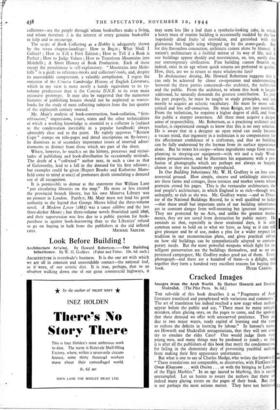Collecting Books
THERE are people who are frightened of book-collecting—some because they fear the expense, others because they do not know how to start, others because they are suspicious of dealers and think they will be over-reached. There are also people who con- found the activity with bargain-hunting, whose pleasure in their acquisitions is neither a delight in fine books for their own sake nor an eagerness to learn from them, but merely a desire to be able to say : " And only five bob, with old So-and-So round the corner asking two guineas! " There is a third- class who regard themselves as book-collectors just because they buy books. These are the folk who talk about "picking up books." "Look what I picked up the other day." " I must try to pick that up somewhere." To these three classes (and to other smaller groups also) Mr. Muir addresses words of encouragement, of reproof, and even of polite sarcasm. The first (and the only one which matters) he reassures in the matter of expenditure, which will depend on the sort of book its members decide to collect. Naturally if they g for famous rarities or the book-fashions of the day they will have to pay highly, because the demand exceeds the supply; but if they mark down a quarry hitherto neglected or for the time being out of favour, they can go a long way on modest means and have all the fun of the chase into the bargain. Mr. Muir indicates a few sue recommendable quarries, but rightly stresses that these lore ool examples and that Everyman must choose his line for himself. 0 the relationship between collector and bookseller he writes vo indisputable good sense. Every collector makes mistakes; h makes many fewer if he works with the booksellers rater th against them, bearing in mind the simple fact that they—the book Collectors—are the people through. whom booksellers make a living, and whom therefore it is the interest of every genuine bookseller to help and to encourage.
The scope of Book Collecting as a Hobby is adequately shown by the seven chapter-headings : How to Begin - What Shall I Collect? • How to Tell a First Edition ; How to Tell if a Book is Perfect ; How to Judge Values - How to Transform Mountains into Molehills ; A Short History of Book Production. Each of these except the penultimate is self-explanatory. " Mountains into Mole- hills is a guide to reference-books and collectors'-tools, and, despite its unavoidable compression, a valuable compilation. I regret the omission of the Concise Cambridge History of English Literature, which in my view is more nearly a handy equivalent to its 15- volume predecessor than is the Concise D.N.B. to its even more extensive prototype. It may also be suggested that the numerous histories of publishing houses should not be neglected as source- books for the study of most collecting subjects from the last quarter of the eighteenth century onward. - Mr. Muir's analysis of book-construction, book-collation, " first,. editionism," impressions, issues, states and the other technicalitiei of which a working knowledge is essential to a collector is (subject to the condensation inevitable in a popular handbook) always admirably clear and to the point. He rightly approves " Review Copy " stamps on title-pages and dated inscriptions on fly-leaves ; he dismisses as of secondary importance issues of inserted adver- tisements as distinct from those which are part of the sheet.
Where, however, he touches on the history, processes and vicissi- tudes of publishing and book-distribution he occasionally misleads. The death of a " collected " author may, in such a case as that of Galsworthy, lead to a fall in the demand for his first editions ; but examples could be given (Rupert Brooke and Katherine. Mans- field come to mind at once) of premature death stimulating a demand out of all recognition.
It is permissible to demur at the statement that William Lane " put circulating libraries on the map." He more or less created the provincial branch library, but his own Minerva Library was no pioneer in London. Further, Mr. Muir must not lend his great authority to the legend that George Moore killed the three-volume novel. A Modern Lover (1883) was a-cause Mare and the last three-decker Moore ; but three-volume novels flourished until 1896, and their supersession was less due to a public passion for book- purchase as against book-borrowing than to the Libraries' refusal to go on buying in bulk from the publishers at the old inflated



























 Previous page
Previous page